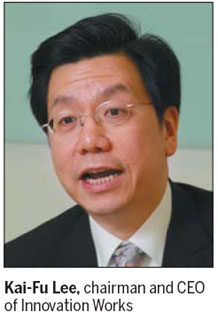
Top tech executives will challenge short sellers of Chinese listed firms
Chinese companies should learn how to defend themselves when they face unjust accusations and short-selling of their shares, said Kai-Fu Lee, a high-profile information technology executive.
Being resolute in fighting the mudslingers is in itself a statement about one's stand and record, said Lee, after he rounded up a group of the country’s top technology executives to defend US-listed Chinese companies from being hit by short sellers such as Andrew Left, a research blogger.

Lee is chairman and CEO of the Beijing-based Innovation Works, an incubation service for technology startups, and former head of Google China.
In response to the reported threat of legal action by Left — the financial blogger behind Citron Research — Lee said that threatening legal action does not amount to a proper response to the mistakes in Left's published stock analysis work that he has pointed out.
"I would rather see him answer my questions first. Some of them are actually very simple and basic," Lee said.
In one of the mistakes in the piece of analysis that Lee pointed out, a Chinese search engine is described as using a new search method that is simply illogical and that does not exist, Lee told China Daily on Friday.
Left has published many pieces of negative analysis on US-listed Chinese stocks. There were times, Lee admitted, when he was right. But more recently, Lee noted, Left has been abusing his reputation and the quality of his research has become shaky, especially when he is no longer satisfied with attacking small companies and starts targeting bigger ones.
"His is basically a one-man operation," Lee said. "Of course we know there are people feeding him information. But it’s hard to imagine by anyone with a rational mind that just one man can keep producing things of solid quality."
As to why short sellers such as Left could have made mistakes about basic facts, Lee said that perhaps it was because he has too much confidence in himself, because he thought that regular US investors know nothing about China, or also because he thought that ordinary Chinese people prefer not to fight back immediately after they are attacked.
Most importantly, he said, the asymmetrical flow of information between China and the United States can be very harmful. It could be used to deceive investors in many ways, he added.
The Taiwan-born American also said that the US capital markets remain an ideal destination for innovative companies, especially high-tech companies — although companies that have services that do not exist in the US, such as advertising screens in elevators or online games, may have trouble offering the investors convincing stories.
Today, about 80 percent of China’s technology startups are built on models designed for future listings in overseas capital markets. If their image is somehow tarnished by muckrakers then maybe startups will find themselves in trouble when they try to get listed overseas in the next three to five years.
"That’s why we have an interest, and we admit it openly, in defending the name of Chinese companies," Lee said.
On the part of Chinese companies, especially those already listed overseas, Lee said, there is also great room for improvement in their own management techniques and communication with investors.
The most crucial thing is to have truthful and authentic financial data. And extra points can be earned when they explain their businesses to local investors.
They must learn how to deal with overseas media. But now, Lee said, some companies do not even give a useful telephone number to the Wall Street Journal.
Also, he said, if they ever feel they are being unfairly treated, they should react immediately, especially by using the legal system to protect themselves. Spending more money for this purpose is worthwhile.
Last but not the least, many Chinese companies, even some large ones, still have to attach adequate importance to investor relations. The more companies earn trust from institutional investors, the less their shares can be influenced by small bloggers, Lee said.
The joint letter denouncing short sellers that Lee initiated was originally signed by 61 people. By Friday afternoon, Lee said he had collected 66 signatures.
Contact the writers at edzhang@chinadaily.com.cn, xiejingwei@chinadaily.com.cn
 Washington to remain focused on Asia-Pacific
Washington to remain focused on Asia-Pacific RQFII target blue chips amid bear market
RQFII target blue chips amid bear market Australian recall for top two exporters
Australian recall for top two exporters China fears new car restrictions
China fears new car restrictions